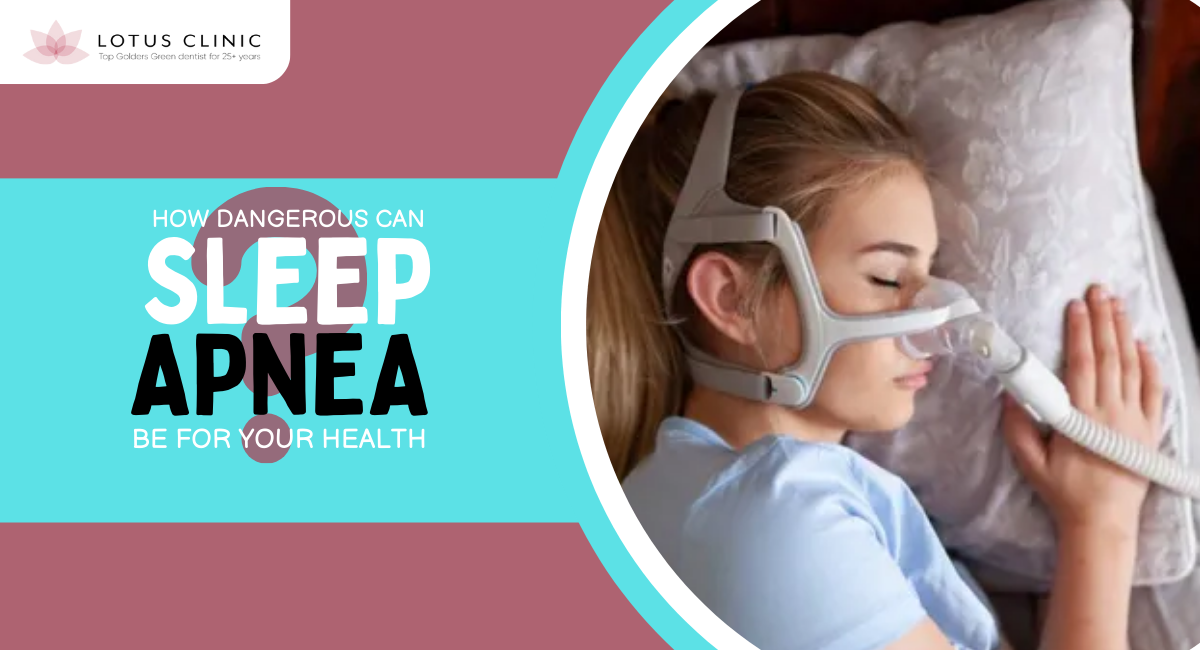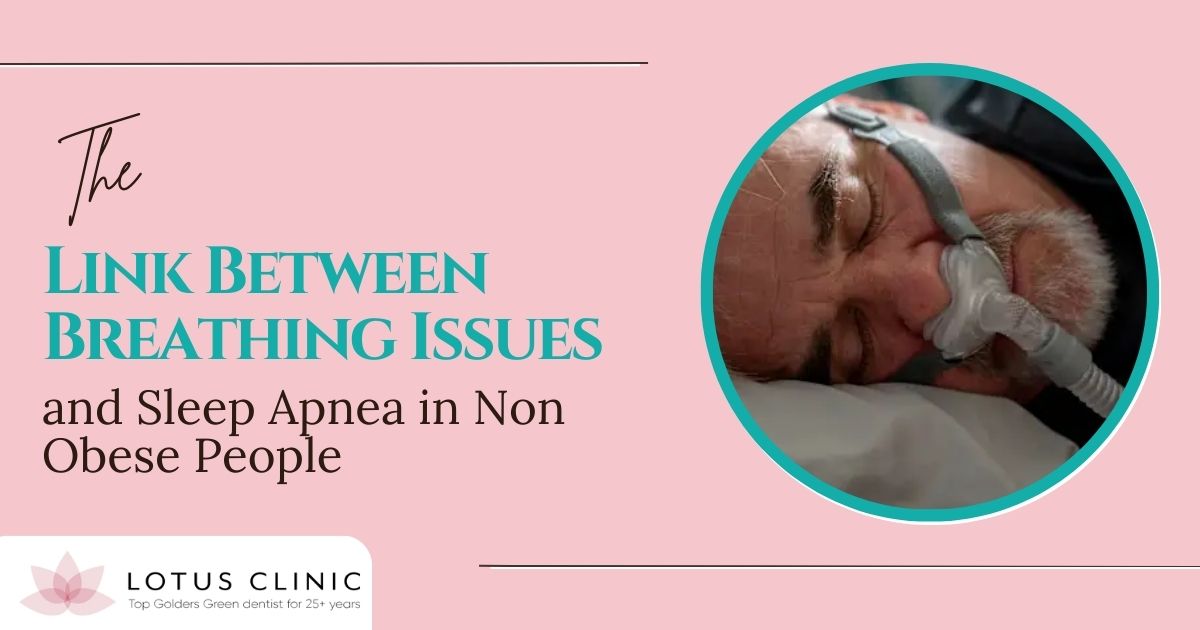943 Finchley Rd, London NW11 7PE
How Dangerous Can Sleep Apnea Be for Your Health?

Do you wake up feeling tired even after a full night’s sleep?
Or, do you catch yourself gasping for air in the middle of the night?
These are just a few signs of sleep apnea, a condition that disrupts your sleep and can severely affect your health if left untreated. Sleep apnea might seem like a minor inconvenience, but its impact on your overall well-being can be much more serious than you think.
Ignoring the warning signs of sleep apnea can lead to long-term health risks, including heart disease, high blood pressure, and even diabetes. Sleep is essential to the body’s recovery, and untreated sleep apnea robs you of that vital restoration.
In this blog, we’ll explore the different types of sleep apnea, the immediate and long-term health dangers, and how you can take steps to regain control of your sleep and health. Let’s dive in and understand how dangerous sleep apnea can truly be for your body and life.
Types of Sleep Apnea and How They Affect You
Understanding the types of sleep apnea is essential for grasping how they impact your health. The three main types include:
- Obstructive Sleep Apnea (OSA): This is the most common type. It occurs when the throat muscles relax excessively during sleep, leading to blocked airways. OSA can cause snoring and choking sensations, disrupting sleep and causing daytime fatigue.
- Central Sleep Apnea (CSA): Unlike OSA, CSA happens when the brain fails to send proper signals to the muscles that control breathing. This type is less common and often related to underlying health issues, such as heart failure.
- Complex Sleep Apnea Syndrome: This is a combination of OSA and CSA. Individuals with this type may initially show signs of OSA, but as treatment progresses, they develop CSA.
The most common type is OSA, primarily due to factors like obesity, age, and lifestyle choices. Each type presents unique health risks, and recognising which one you have can help tailor your sleep apnea treatment plan.
Short-Term Health Risks of Sleep Apnea
Sleep apnea’s immediate effects can significantly disrupt daily life. Here are some short-term health risks to consider:
- Fatigue: Waking up tired can affect your productivity, making it hard to concentrate.
- Cognitive Impairment: Sleep deprivation from apnea can lead to difficulties with memory and decision-making. You might find yourself struggling to remember simple tasks or information.
- Mood Changes: Sleep apnea can make you irritable and more prone to mood swings. Your relationships may suffer due to your lack of patience or enthusiasm.
- Increased Risk of Accidents: Drowsiness can lead to dangerous situations, such as falling asleep while driving or making mistakes at work.
Overall, the lack of restorative sleep from sleep apnea can create a cycle of fatigue, stress, and decreased quality of life, making it vital to address the condition early.
Serious Long-Term Health Risks
If left untreated, sleep apnea can lead to severe long-term health risks. Here’s how it can affect your body:
- Cardiovascular Diseases: Sleep apnea increases the risk of high blood pressure, heart attack, and stroke due to interrupted sleep patterns that stress the cardiovascular system.
- Diabetes Risk: Poor sleep can interfere with insulin sensitivity, increasing the likelihood of developing type 2 diabetes.
- Mental Health Disorders: Chronic sleep deprivation from apnea can lead to depression and anxiety. The constant struggle to breathe at night can exacerbate these conditions.
- Respiratory Issues: Ongoing breathing problems during sleep can worsen existing lung conditions, making it harder for you to breathe.
Being aware of these risks can motivate you to seek treatment and make lifestyle changes to protect your health.
Impact of Sleep Apnea on Quality of Life
Sleep apnea affects more than just your sleep; it impacts your entire quality of life:
- Personal Relationships: The snoring and sleep disturbances can strain relationships, causing partners to sleep in separate rooms.
- Professional Life: Reduced focus and productivity can lead to decreased work performance and missed opportunities for advancement.
- Energy Levels: Constant fatigue can diminish your motivation, making it hard to engage in activities you once enjoyed.
- Obesity Link: Sleep apnea can contribute to weight gain due to hormonal imbalances that increase appetite and cravings for unhealthy foods.
Addressing sleep apnea can lead to a happier, more fulfilling life, improving both personal and professional aspects.
How Sleep Apnea Affects Children and Adolescents?
Sleep apnea isn’t just a concern for adults; it can pose unique risks for children and adolescents. Consider the following:
- Learning Difficulties: Children with sleep apnea may experience issues with concentration and memory, leading to poor academic performance.
- Behavioral Problems: Sleep deprivation can manifest as hyperactivity, irritability, and mood swings, mimicking ADHD symptoms.
- Growth Challenges: Chronic sleep issues can affect a child’s growth and development, as sleep is essential for physical and mental development.
Diagnosing and Treating Sleep Apnea
Diagnosing sleep apnea involves several steps:
- Sleep Studies: A sleep study, or polysomnography, measures your breathing patterns and oxygen levels during sleep. Home sleep tests are also available for convenience.
- Common Symptoms to Watch For: Be mindful of loud snoring, gasping for air, and excessive daytime sleepiness.
Once diagnosed, treatment options include:
- CPAP Machines: Continuous positive airway pressure (CPAP) devices help keep airways open during sleep.
- Oral Appliances: Custom-fitted devices can reposition the jaw to help maintain an open airway.
- Lifestyle Changes: Weight loss, avoiding alcohol, and sleeping on your side can significantly improve symptoms.
When to Seek Medical Help?
Recognising the signs of sleep apnea is vital for your health. Here’s when to seek medical help:
- Key Signs to Watch For: Loud snoring, gasping for breath during sleep, and persistent daytime fatigue warrant a consultation.
- Consulting a Healthcare Professional: Don’t hesitate to reach out if you notice symptoms. Early intervention can prevent severe complications.
- Long-Term Consequences: Untreated sleep apnea can lead to heart disease, stroke, and even early death. Prioritise your health by addressing symptoms promptly.
Understanding the dangers of sleep apnea is crucial for your health. Ignoring the signs can lead to serious long-term complications that affect every aspect of your life. By recognising the symptoms and seeking prompt treatment, you take a vital step toward better health and improved quality of life. Don’t wait for the situation to worsen—prioritise your well-being and discuss your concerns with a healthcare professional. You deserve restful nights and energised days!






